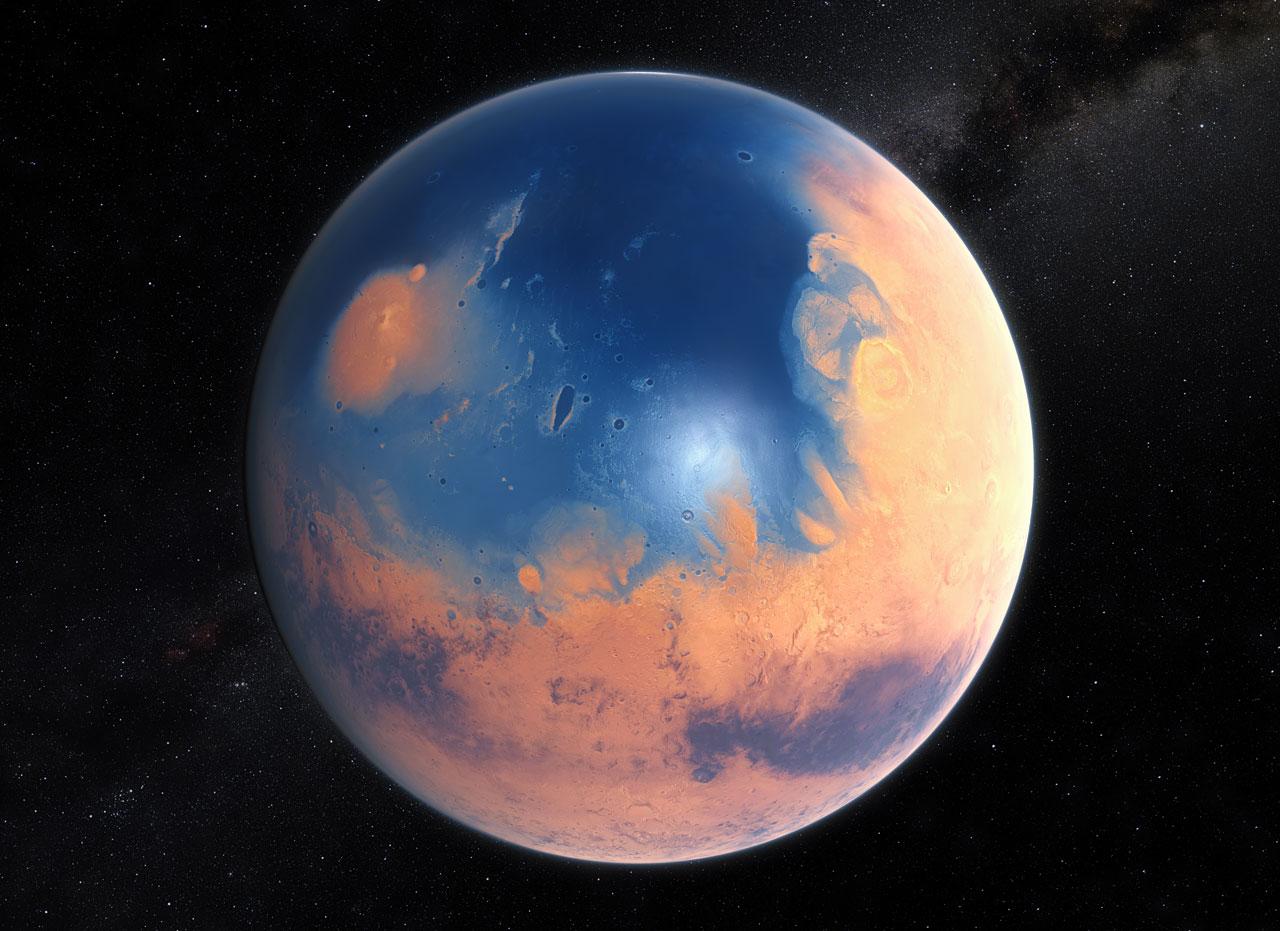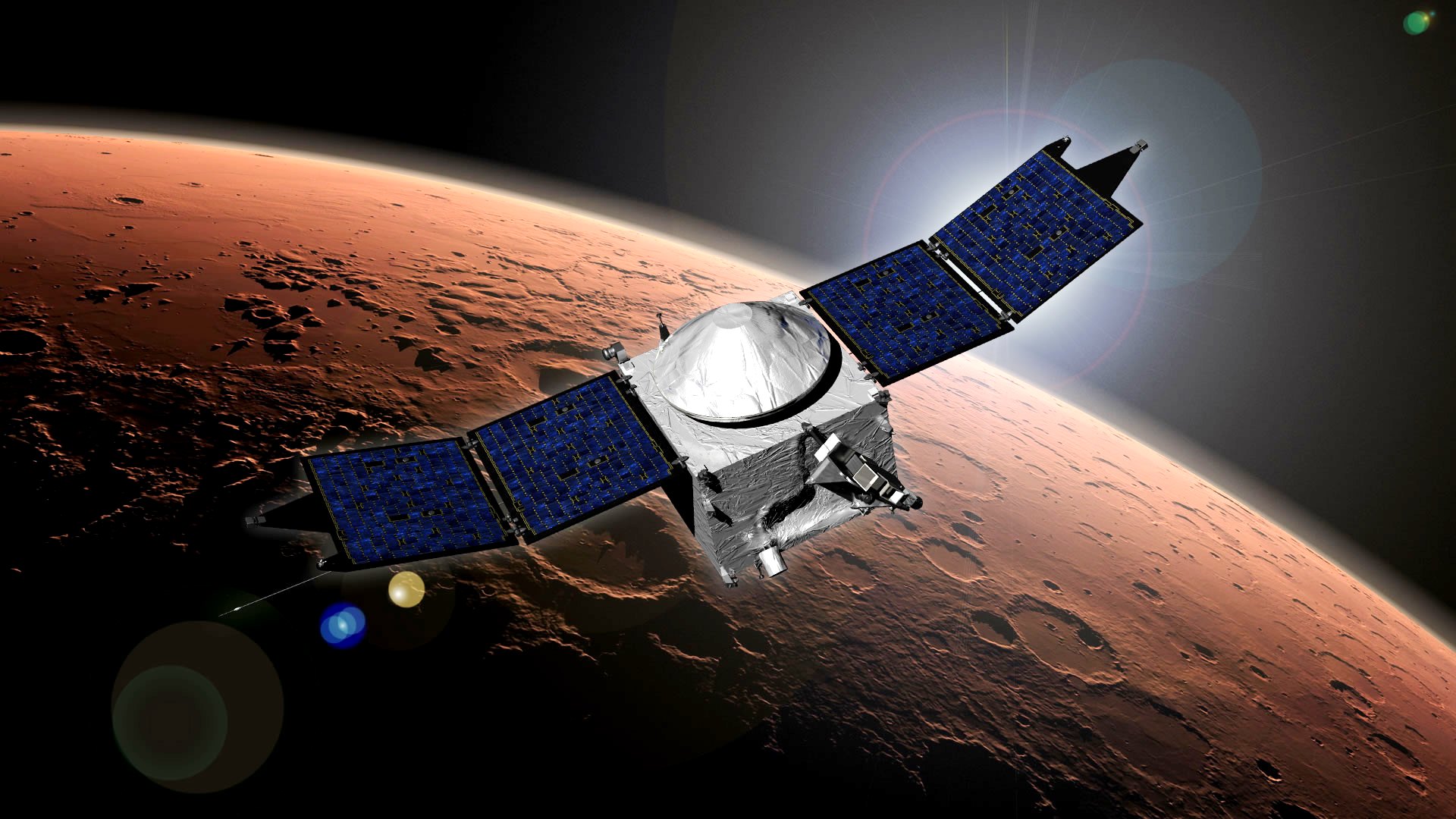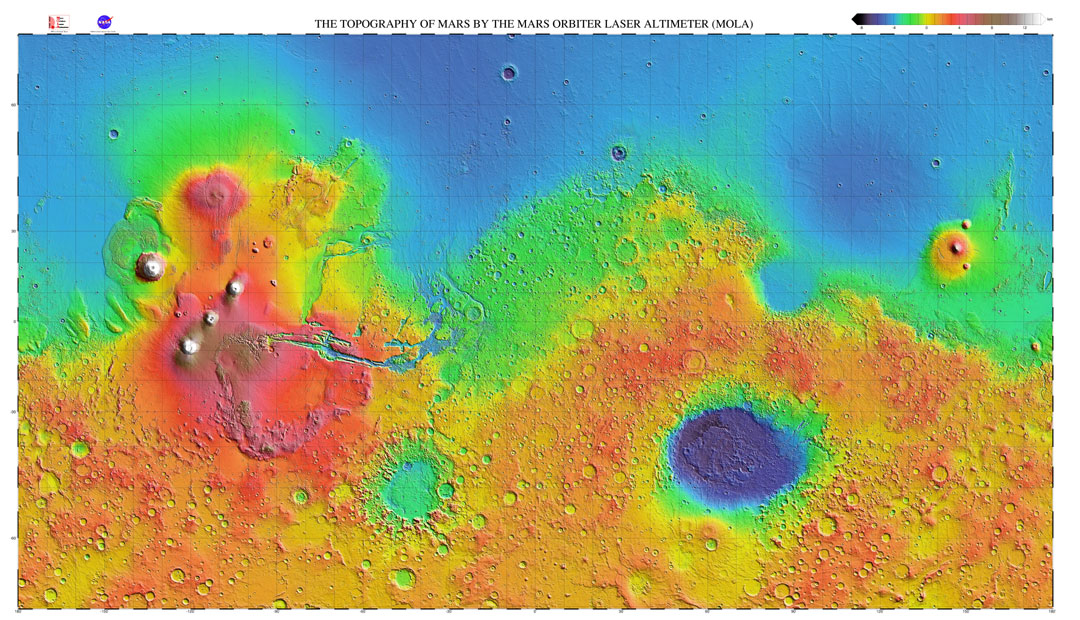Was Ancient Mars Warm? Planet's History Takes Watery New Twist

A new six-year analysis of water on Mars suggests that the Red Planet has lost the equivalent of an ocean's worth of water over the past four billion years. However, the question of whether Mars was ever warm enough to have hosted such an ocean has sparked debate.
The research, conducted using the European Southern Observatory's Very Large Telescope (VLT) in Chile, and supported by the WM Keck Observatory and NASA's Infrared Telescope Facility, both in Hawaii, has revealed how much water has escaped from Mars' atmosphere throughout its history. The results suggest that the lost water could have once filled an ocean in Mars' northern lowlands to a depth of up to 1 mile (1.6 kilometers), covering 19 percent of the Red Planet's surface.
"It implies that a substantial amount of water was available during the first billion years on Mars, raising the possibility that ancient Mars was habitable," Geronimo Villanueva, a planetary scientist at NASA's Goddard Space Flight Center in Greenbelt, Maryland, told Astrobiology Magazine. [The Search for Water on Mars in Photos]
Villanueva is the lead author of the paper describing the results in the March 2015 issue of the journal Science.

Villanueva's team exploited the chemistry of water molecules to trace the history of water on Mars back through time. Water molecules are two parts hydrogen and one part oxygen, but hydrogen can also come in an alternative form as a ‘heavy' isotope called deuterium that has a proton and a neutron in its nucleus, rather than the single proton that regular hydrogen atoms have.
Water molecules that contain deuterium are referred to as heavy (with two deuterium atoms) or semi-heavy (with one deuterium and one hydrogen atom) water, and for good reason as regular water can be stripped from Mars' atmosphere and lost to space much more easily.
"Over a long time, the lighter form [of water] will escape preferentially relative to the heavy form," Villanueva said.
Get the Space.com Newsletter
Breaking space news, the latest updates on rocket launches, skywatching events and more!
Over billions of years, this preferential water loss has left Mars enriched in semi-heavy water compared to regular water by a factor of seven times greater than the ratio in Earth's water. Extrapolating backward from the current ratio of "normal" hydrogen to deuterium, and incorporating factors such as collisions between water molecules and the predominant molecule in Mars' atmosphere, carbon dioxide, Villanueva's team were able to calculate how much water Mars has lost.
Mars still has water, of course, locked up in its polar caps and underground. If you could take all the water that exists today on Mars, and put it on the surface in liquid form, it would form an ocean 69 feet (21 meters) deep. However, Mars has lost so much water — more than all the water in Earth's Arctic Ocean — that in the past it could potentially have created an ocean 449 feet (137 m) deep. Yet that pales in comparison to Earth, which has enough water for a global ocean several kilometers deep.
Robin Wordsworth, a planetary scientist at the Harvard School of Engineering and Applied Sciences who was not involved in the study, does not interpret the results as necessarily describing a habitable planet.
"Their [Villanueva et al.'s] results are entirely consistent with a predominantly cold, icy scenario for early Mars," said Wordsworth. "A global depth of 137 meters still implies a relatively dry planet, and doesn't allow a deep northern ocean. The water could have mainly been in the form of ice rather than liquid."

If Wordsworth is correct, then what at first may have appeared to be a boon for theories that Mars was once warm and wet for sustained periods may be nothing of the sort. Although we see evidence all over Mars that water once flowed freely, cutting river channels and gullies, spreading onto flood plains and altering the chemistry of the minerals near the surface, such evidence could have been created by liquid water acting over relatively short timescales. If Mars really had a northern ocean, the planet's climate would need to have been warm for at least its first billion years.
According to Bethany Ehlmann of the California Institute of Technology in Pasadena, the evidence for a northern ocean is scant.
"An ocean is an intriguing possibility," she said. "But mineralogical evidence, such as carbonates or evaporites, which are typical of evidence for Earth's large ocean basins, has not been found in the north, although researchers are still looking."
For his part, Villanueva remains optimistic on the matter.
"It is difficult to assess the temperature of ancient Mars, and for how long water was in liquid form, from our results," he said. "But our results do indicate that a substantial amount of water was available in the past."
Crucial questions remain. Part of Villanueva's study was to determine patterns in seasonal microclimates on Mars, and discover whether there are any other sources of water that have passed into the atmosphere besides that coming from the ice caps. Furthermore, NASA's MAVEN (Mars Atmosphere and Volatile EvolutioN) spacecraft, now in orbit around the Red Planet to investigate the history of Mars' atmosphere, will be able to peel away new layers in the mystery of Mars' water.
"We still don't know how the molecules are escaping," he said. "MAVEN's more sophisticated measurements are going to give us a much better idea of how and when the molecules escaped from Mars."
The new results have constrained our ideas about how much water may have been present on the Red Planet's surface long ago, but they provide no concrete information about habitable conditions. The hope now is that MAVEN will go the final stretch and give us the conclusive history of water on Mars, researchers said.
This story was provided by Astrobiology Magazine, a web-based publication sponsored by the NASA astrobiology program. Follow Space.com @Spacedotcom, Facebook and Google+.
Join our Space Forums to keep talking space on the latest missions, night sky and more! And if you have a news tip, correction or comment, let us know at: community@space.com.

Keith Cooper is a freelance science journalist and editor in the United Kingdom, and has a degree in physics and astrophysics from the University of Manchester. He's the author of "The Contact Paradox: Challenging Our Assumptions in the Search for Extraterrestrial Intelligence" (Bloomsbury Sigma, 2020) and has written articles on astronomy, space, physics and astrobiology for a multitude of magazines and websites.










